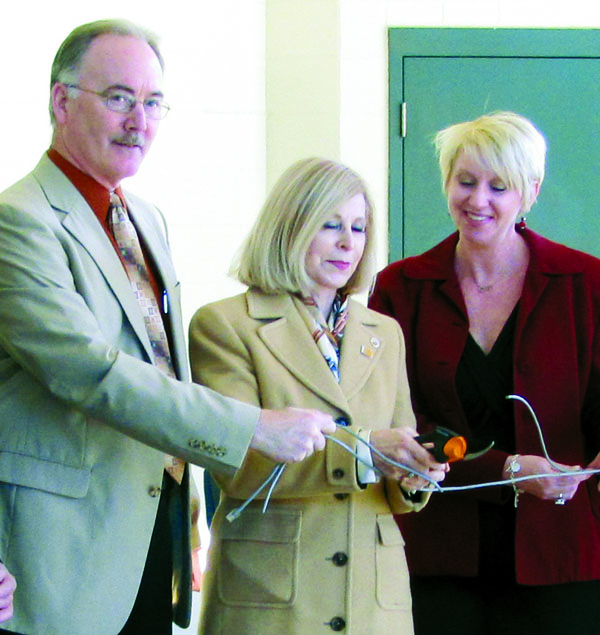PORT ANGELES — Residents can step outside their homes with smartphones, tablets or laptops and go online through a new city Internet network nicknamed “The Mesh.”
Mayor Cherie Kidd, along with other dignitaries, cut a computer cable during a ceremony Monday at The Gateway pavilion downtown to mark the ceremonial activation new $3.7 million Wi-Fi system, thought to be unique in the U.S., if not the world.
The system offers at least two levels of service — one system for public safety workers and another for public Wi-Fi access.
The public safety system allows police officers to track each other through the city so that they know where their backup is without having to call radio dispatchers.
They also can do their own searches on driver’s licenses and license plates, check recent call histories and access reports, said Officer Erik Smith, who demonstrated the use of the system in his patrol car.
Eventually, the system will be patched into the city’s security cameras and police car dashboard cameras — and potentially Port Angeles School District security cameras — so that officers will be able to monitor situations at City Pier from their cars at Lincoln Park, said Police Chief Terry Gallagher.
“The limitation is our imagination,” Gallagher said.
The system also offers interconnectivity among agencies so that each of the many law enforcement agencies can communicate with increased efficiency, he said.
Public access to the system is free through the end of October, but curious users already have been plying the system, which covers almost the
entire city.
“We began beta-testing in September and had an average of 200 users a day,” said Charles “Doc” Beaudette, general manager of OlyPen.
As of Nov. 1, Wi-Fi service will be managed by OlyPen MetroNet, with both mobile and fixed-point service plans, ranging from $4.95 to $37.95.
The system is not meant to replace wired systems such as DSL or direct fiber optic service but to supplement them for those who may not be able to install wired systems, Beaudette said
The extensive Wi-Fi system was possible because those creating the network had the cooperation of a utility system that already had the infrastructure in place, said Columbia Telecommunications Corp. founder and principal engineer Lee Afflerbach, who designed much of the system for the city.
The system that was created depended on the ability of the many public and private entities who were willing to work together, Afflerbach said.
“Port Angeles has unique character. It is small enough to work with but big enough to be real,” he said.
Afflerbach said he engineered the system for a major Silicon Valley city that initially expressed interest in a citywide Wi-Fi network but ultimately backed out.
“Port Angeles was the first to say, ‘Do it,’” he said.
Testing through the next few months is expected to reveal bugs and areas where there may be weak signals.
Some of those holes are expected to be found as police computers switch between their normal connection through The Mesh and a backup cellular service when operating outside of The Mesh, Gallagher said.
Engineers expect to add two or more new service connection points as those holes are discovered.
Reporter Arwyn Rice can be reached at 360-452-2345, ext. 5070, or at arwyn.rice@peninsuladailynews.com.

